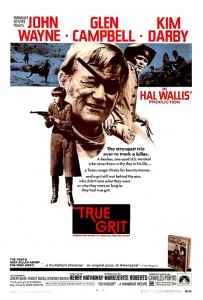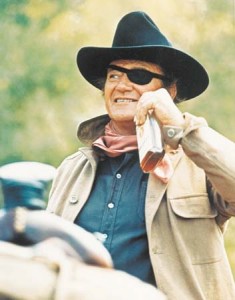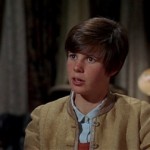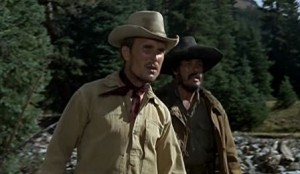
The strangest trio ever to track a killer. A fearless, one-eyed U.S. marshal who never knew a dry day in his life… a Texas ranger thirsty for bounty money… and a girl still wet behind the ears who didn’t care what they were or who they were as long as they had true grit.
True Grit. As most know, the current Coen Brothers version just hit the theaters a few weeks ago which is in fact a remake of one of “the more recent” John Wayne films, this one bearing the same title but made in 1969 and directed by stalwart director Henry Hathaway. Having not seen the new release yet, I can not compare it to the original. However, unlike most, I feel it will be quite easy to surpass Wayne’s efforts of thirty plus years ago, even if it did garner Wayne his second Academy Award nomination and his only win.
True Grit is, for me, a rather formulaic film, with an unlikely trio bound together for a common goal. Wayne play drunk and half blind Marshal Rooter Cogburn, who has been hired by Mattie, played by Kim Darby, to find the man who murdered her father. Joining them in their hunt is a Texas Marshall, La Boeuf, played by country western star Glen Campbell.
The object of their pursuit is one Tom Chaney, played by Jeff Corey. Luckily he is part of a band of sorts headed by Robert Duvall and also including Dennis Hopper. So there is some star power here. Unfortunately the result is a high end TV movie- but one filmed on location.
I felt Cogburn was the stereotypical marshal on the border of being a ruffian himself, with a craggy and gruff exterior and a kind and soft heart. Cogburn’s last on screen comment of “Come and see a fat old man sometime!” as he rides off is perhaps reflective both of the nature of the film and Wayne himself at this point in his career. Both were past their prime and fading, but still with the occasional gasp of life remaining.
The storyline is a bit cloying, and perhaps this is more the result of the many similar stories which have hit the screens – both large and small – since 1969. We have the meeting of the trio, their internecine bickering and ultimate bonding together. There is also the “first skirmish” where we meet the outlaw band, “the chase,” and “the final confrontation.” All run fairly as expected, and the end shootout is well staged if predictable in its outcome.
Thankfully the filmed location is not Monument Valley, the home of many of John Ford’s better films. Although set in Oklahoma the film was made for the most part in Colorado, which bears little resemblance to Oklahoma. The atmosphere is well captured and the cinematography is quite well done, with several of those scenic long-shots we have come to expect from the western genre.
 Wayne is Wayne for the most part. For my money he was always an actor with a limited range, but in his milieu, the western, there is no better. His charisma here is still intact and the gleam is still in the eye, but we’ve begun to see a bit of what has become the Wayne stereotypical performance, especially in his later pictures. Most likely his Oscar was more for lifetime achievement rather than this performance, which, for my money is rather pedestrian and in line with his other films, Wayne himself felt the Oscar should have gone to Richard Burton for his role in Anne of the Thousand Days.
Wayne is Wayne for the most part. For my money he was always an actor with a limited range, but in his milieu, the western, there is no better. His charisma here is still intact and the gleam is still in the eye, but we’ve begun to see a bit of what has become the Wayne stereotypical performance, especially in his later pictures. Most likely his Oscar was more for lifetime achievement rather than this performance, which, for my money is rather pedestrian and in line with his other films, Wayne himself felt the Oscar should have gone to Richard Burton for his role in Anne of the Thousand Days.
 Kim Darby is annoying and confrontational, and unfortunately only some of this is in the character. She is never really believable here and detracts from the film. Most would disagree with me here as she is usually seen as a fine complement to Wayne. (Wayne also detested her, calling her the worst of his leading ladies.) Glen Campbell is actually quite good- another change from accepted standard opinion. His casual saunter and random bouts of seriousness, mixed with some levity, came through in a pleasantly strong way.
Kim Darby is annoying and confrontational, and unfortunately only some of this is in the character. She is never really believable here and detracts from the film. Most would disagree with me here as she is usually seen as a fine complement to Wayne. (Wayne also detested her, calling her the worst of his leading ladies.) Glen Campbell is actually quite good- another change from accepted standard opinion. His casual saunter and random bouts of seriousness, mixed with some levity, came through in a pleasantly strong way.
The villains are for the most part nondescript, including Dennis Hopper. The only one with a true character here is “Lucky” Ned Pepper, played by Robert Duvall, who is his usual outstanding self and key in the conflict with Cogburn. There is also a significant part to note here- a piece which would not be included in today’s films. I’m curious to see how it is in the new version as well.
 First, it is unique that the object of Cogburn’s quest isn’t Ned Pepper, the band’s leader, but rather a throwaway member in the form of Tom Chaney, who plays a fairly minor role, all things considered. Today Chaney would be the leader in a heartbeat. Even more importantly is the lack of sexual overtones or suggestions, especially when Mattie’s been kidnapped by Pepper. Today most assuredly there would be suggestions of rape or torture or something else rather vile. Nothing of the sort here, just Pepper’s comment that he “will do what needs to be done.” Presumably this means killing Mattie if pressed.
First, it is unique that the object of Cogburn’s quest isn’t Ned Pepper, the band’s leader, but rather a throwaway member in the form of Tom Chaney, who plays a fairly minor role, all things considered. Today Chaney would be the leader in a heartbeat. Even more importantly is the lack of sexual overtones or suggestions, especially when Mattie’s been kidnapped by Pepper. Today most assuredly there would be suggestions of rape or torture or something else rather vile. Nothing of the sort here, just Pepper’s comment that he “will do what needs to be done.” Presumably this means killing Mattie if pressed.
On a final note Elmer Bernstein’s great score bears mentioning, for it is a great score. For which film I am not sure, as it is a bit overly exuberant for this one. Moments of suspense are blown by banging drums and the like. It is a good score, just not matched to the right work.